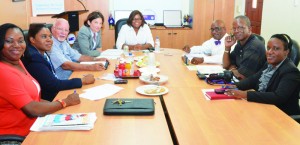
The Anguilla Chamber of Commerce and Industry invited the media to a 12.30 luncheon meeting which business executives had with Governor Christina Scott on Tuesday this week.
Chamber President, Attorney-at-Law, Keithley Lake, led his colleagues in discussing a number of suggestions and concerns with the Governor. At the outset, Mr Lake described the meeting as a very unusual gesture by the Governor in that the Chamber usually met at the Governor’s Office for discussions but, on this first occasion, the Queen’s representative turned up at the Chamber’s Office instead for the meeting. “We have taken note of this and we welcome you to our modest facilities,” he told Ms Scott.
Mr Lake continued: “The Anguilla Chamber of Commerce has, over the past of couple of years, been increasingly involved in elevating its status in the community, and within Government, on issues that are relevant to the economy of the island and its social wellbeing and, in particular, business regulations. We do not have any official stakeholder status and we are going to talk today on a number of things we are working on seeking to get that kind of status. This is because it is very important, particularly in these difficult times, that the opinions and the voices of the business community are heard on a whole range of issues. I thought that it would be important to let you know what we, as a Chamber, have been involved in over the past couple of years. I have prepared to take with you a whole package of information in addition to what I am going to say.”
Mr Lake told the Governor that she had come to Anguilla at a very critical period when it appeared that everything was going in the wrong direction. “Our tourism is down, we are experiencing increasing levels of crime and the Government is having severe fiscal problems. This is not a good mix because all of these things tend to be interrelated,” he said.
The Chamber President spoke about a number of matters that came out of a recent seminar held by his organisation. He was of the view that those matters did not require a lot of money to implement but that there was a lack of political will to get them done. He listed as the number one issue “that our island is dirty” and “needs to be cleaned up.” He stressed that there was a need to institute “meaningful regulations to keep our island clean”; that “we have to bring into the public consciousness that we depend heavily on our tourism – and to clean up the island is something that is not going to require a whole lot of money.”
Other issues Mr Lake spoke about included the attitude of public servants at points of reception of persons which he described as an on-going subject for many years; the ferryboat service; low tourism occupancy levels on the island due to access difficulties; and the on-going Cap Juluca issue on which the Chamber wrote to the British Government but still needed to be resolved. Among other matters he also spoke about the need to properly equip the Police so that they would be able to do their work on the island efficiently.
“You will find that some of the suggestions we have made here are a lot of commonsense things that could be implemented and that send a clear message that the community will no longer accept,” he added.
There were initial discussions between the Chamber officials and the Governor on the various matters raised by Mr Lake and his colleagues. The Governor undertook to study the suggestions and concerns presented to her and to formally respond to them at a later date.







